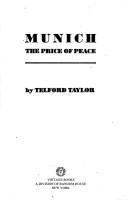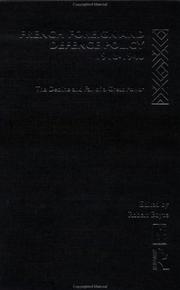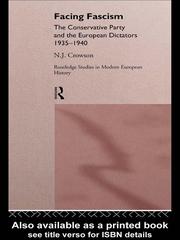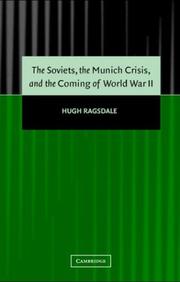| Listing 1 - 10 of 11 | << page >> |
Sort by
|
Book
ISBN: 9140048357 Year: 1981 Publisher: Lund Gleerup
Abstract | Keywords | Export | Availability | Bookmark
 Loading...
Loading...Choose an application
- Reference Manager
- EndNote
- RefWorks (Direct export to RefWorks)
World politics --- Coexistence (World politics) --- Peaceful coexistence --- Munich Four-Power Agreement --- Minhenski dogovor --- Mnichovská dohoda --- Münchener Abkommen --- Münchner Abkommen --- Münchner Diktat --- Munich Agreement --- Munich Pact --- Munich Settlement --- United States --- Foreign relations --- Mi︠u︡nkhenski dogovor --- Мюнхенски договор --- Mi︠u︡nkhenskiĭ sgovor --- Мюнхенский сговор

ISBN: 0394744829 Year: 1979 Publisher: New York, N.Y. Vintage
Abstract | Keywords | Export | Availability | Bookmark
 Loading...
Loading...Choose an application
- Reference Manager
- EndNote
- RefWorks (Direct export to RefWorks)
World War, 1939-1945 --- National socialism --- Causes --- Munich Four-Power Agreement --- Minhenski dogovor --- Mnichovská dohoda --- Münchener Abkommen --- Münchner Abkommen --- Münchner Diktat --- Munich Agreement --- Munich Pact --- Munich Settlement --- Mi︠u︡nkhenski dogovor --- Мюнхенски договор --- History of Europe --- anno 1930-1939 --- Mi︠u︡nkhenskiĭ sgovor --- Мюнхенский сговор

ISBN: 1134748272 128014050X 0203979222 9780203979228 9780415150392 0415150396 0415150396 9786610140503 6610140502 9781134748273 9781134748228 9781134748266 1134748264 Year: 1998 Publisher: London New York Routledge
Abstract | Keywords | Export | Availability | Bookmark
 Loading...
Loading...Choose an application
- Reference Manager
- EndNote
- RefWorks (Direct export to RefWorks)
French Foreign and Defence Policy, 1918-1940 outlines France's strategies for protection and appeasement during this period and places interwar relations in a larger European context. This book examines: * relationships with key countries such as Italy and Russia * the significance of interwar France to 20th Century European integration * the historical context of the policies * the setbacks and defeats of the period and how they should be evaluated
International relations --- History --- Munich Four-Power Agreement --- Minhenski dogovor --- Mnichovská dohoda --- Münchener Abkommen --- Münchner Abkommen --- Münchner Diktat --- Munich Agreement --- Munich Pact --- Munich Settlement --- Mi︠u︡nkhenski dogovor --- Мюнхенски договор --- France --- Maginot Line (France) --- Ligne Maginot (France) --- Maginot Line --- Foreign relations --- History, Military --- Economic policy --- Mi︠u︡nkhenskiĭ sgovor --- Мюнхенский сговор
Book
ISBN: 9010015033 9789010015037 Year: 1976 Volume: vol *16 Publisher: Amsterdam Elsevier
Abstract | Keywords | Export | Availability | Bookmark
 Loading...
Loading...Choose an application
- Reference Manager
- EndNote
- RefWorks (Direct export to RefWorks)
World history --- anno 1900-1999 --- World politics --- -World politics --- -Colonialism --- Global politics --- International politics --- Political history --- Political science --- Eastern question --- Geopolitics --- International organization --- International relations --- Munich Four-Power Agreement --- Coexistence (World politics) --- Peaceful coexistence --- Minhenski dogovor --- Mnichovská dohoda --- Münchener Abkommen --- Münchner Abkommen --- Münchner Diktat --- Munich Agreement --- Munich Pact --- Munich Settlement --- Mi︠u︡nkhenski dogovor --- Мюнхенски договор --- Mi︠u︡nkhenskiĭ sgovor --- Мюнхенский сговор
Book
ISBN: 2868472273 2753524947 Year: 1997 Publisher: Presses universitaires de Rennes
Abstract | Keywords | Export | Availability | Bookmark
 Loading...
Loading...Choose an application
- Reference Manager
- EndNote
- RefWorks (Direct export to RefWorks)
Le 4 octobre 1938, à l'Assemblée nationale, un député de droite, seul, vote contre les accords de Munich qui livrent la Tchécoslovaquie à Hitler. Il s'appelle Henri de Kerillis. Fils d'un amiral breton, il s'illustre comme lieutenant de cavalerie, pendant la première guerre mondiale, puis se reconvertit dans l'aviation et se couvre de gloire à la tête de son escadrille de bombardiers. Toute sa vie il restera un combattant. Après la guerre, il quitte l'armée pour le journalisme, et entre à l'Écho de Paris où, très vite, il prend la direction du service politique. Parallèlement, il mène une activité intense : fondation du centre de propagande des Républicains nationaux, création d'un cours d'orateurs, participation aux premières émissions à la radio, etc. Mais le grand mérite d'Henri de Kerillis est d'avoir fait du combat contre l'hitlérisme la priorité absolue. Dans ses articles de l'Écho de Paris, puis de l'Époque (qu'il fonde en 1937), il ne cesse d'en appeler déjà à la résistance, annonçant la guerre qui vient et prônant la modernisation de l'armée. À l'arrivée des Allemands à Paris, il s'envole pour Londres, puis rejoint New York où il crée un journal gaulliste, Pour la victoire, avec Geneviève Tabouis. À partir de 1942, les malentendus s'accumulent avec le chef de la France libre, dont il devient un farouche opposant. Dès lors Kerillis, qui a acheté une ferme, vit en exilé sur ses terres de Long Island. Lui qui fut, dans les années 30, l'« un des rois de Paris », élève des vaches et cultive des pommes de terre, tout en continuant à entretenir, jusqu'à sa mort en avril 1958, une correspondance passionnée avec ses amis de France. Une France dont il était, envers et contre tout, « fou amoureux » selon le mot de Maurice Schumann.
Kerillis, Henri de. --- Munich Four-Power Agreement --- France --- Intellectual life --- Politics and government --- Minhenski dogovor --- Mnichovská dohoda --- Münchener Abkommen --- Münchner Abkommen --- Münchner Diktat --- Munich Agreement --- Munich Pact --- Munich Settlement --- Mi︠u︡nkhenski dogovor --- Мюнхенски договор --- Mi︠u︡nkhenskiĭ sgovor --- Мюнхенский сговор --- Accords de Munich --- biographie --- patriotisme --- Centre de propagande des républicains nationaux --- Droites (science politique) --- opinion publique --- Henri de Kerillis --- occupation allemande
Book
ISBN: 2259006612 Year: 1980 Publisher: Paris Plon
Abstract | Keywords | Export | Availability | Bookmark
 Loading...
Loading...Choose an application
- Reference Manager
- EndNote
- RefWorks (Direct export to RefWorks)
World War, 1939-1945 --- 2ème guerre mondiale --- Causes. --- Diplomatic history. --- Causes --- Histoire diplomatique --- Munich Four-Power Agreement --- -World War, 1939-1945 --- -327 <44> --- 944 "1938/1940" --- European War, 1939-1945 --- Second World War, 1939-1945 --- World War 2, 1939-1945 --- World War II, 1939-1945 --- World War Two, 1939-1945 --- WW II (World War, 1939-1945) --- WWII (World War, 1939-1945) --- History, Modern --- Diplomatic history --- 2ème guerre mondiale --- 327 <44> --- National socialism --- Historiography --- Minhenski dogovor --- Mnichovská dohoda --- Münchener Abkommen --- Münchner Abkommen --- Münchner Diktat --- Munich Agreement --- Munich Pact --- Munich Settlement --- Mi︠u︡nkhenski dogovor --- Мюнхенски договор --- Mi︠u︡nkhenskiĭ sgovor --- Мюнхенский сговор

ISBN: 1280109475 9786610109470 1134742606 0203442687 9780203442685 9781134742608 0203750926 9780203750926 6610109478 9780415153157 9780203442685 0415153158 9781134742554 113474255X 9781134742592 1134742592 9780415757058 0415757053 Year: 2014 Publisher: London Routledge, Taylor & Francis Group
Abstract | Keywords | Export | Availability | Bookmark
 Loading...
Loading...Choose an application
- Reference Manager
- EndNote
- RefWorks (Direct export to RefWorks)
This book provides a complete history of the Conservative party from 1935 to 1940 and explores its responses to the problems of fascism.
Fascism --- World War, 1939-1945 --- National socialism --- Causes. --- Conservative Party (Great Britain) --- Tory Party (Great Britain) --- Scottish Unionist Party --- Liberal Unionist Party (Great Britain) --- Conservative and Unionist Party (Great Britain) --- Conservative Party (Gt. Brit.) --- History. --- Munich Four-Power Agreement --- Minhenski dogovor --- Mnichovská dohoda --- Münchener Abkommen --- Münchner Abkommen --- Münchner Diktat --- Munich Agreement --- Munich Pact --- Munich Settlement --- Mi︠u︡nkhenski dogovor --- Мюнхенски договор --- Europe --- Great Britain --- Foreign relations --- Politics and government --- Mi︠u︡nkhenskiĭ sgovor --- Мюнхенский сговор --- History of the United Kingdom and Ireland --- History of Europe --- anno 1930-1939

ISBN: 9780511511912 9780521830300 9780521099189 0511511914 051116579X 9780511165795 9780511163869 051116386X 0511165323 9780511165320 1280437693 9781280437694 0511164661 9780511164668 9786610437696 6610437696 0521830303 0521099188 1107148111 0511312776 Year: 2004 Publisher: Cambridge New York Cambridge University Press
Abstract | Keywords | Export | Availability | Bookmark
 Loading...
Loading...Choose an application
- Reference Manager
- EndNote
- RefWorks (Direct export to RefWorks)
The Munich crisis is everywhere acknowledged as the prelude to World War II. If Hitler had been stopped at Munich then World War II as we know it could not have happened. The subject has been thoroughly studied in British, French and German documents and consequently we know that the weakness in the Western position at Munich consisted in the Anglo-French opinion that the Soviet commitment to its allies - France and Czechoslovakia - was utterly unreliable. What has never been seriously studied in the Western literature is the whole spectrum of East European documentation. This book targets precisely this dimension of the problem. The Romanians were at one time prepared to admit the transfer of the Red Army across their territory. The Red Army, mobilised on a massive scale, was informed that its destination was Czechoslovakia. The Polish consul in Lodavia reported the entrance of the Red Army into the country. In the meantime, Moscow focused especially on the Polish rail network. All of these findings are new, and they contribute to a considerable shift in the conventional wisdom on the subject.
World War, 1939-1945 --- National socialism --- European War, 1939-1945 --- Second World War, 1939-1945 --- World War 2, 1939-1945 --- World War II, 1939-1945 --- World War Two, 1939-1945 --- WW II (World War, 1939-1945) --- WWII (World War, 1939-1945) --- History, Modern --- Diplomatic history --- Causes. --- Munich Four-Power Agreement --- Minhenski dogovor --- Mnichovská dohoda --- Münchener Abkommen --- Münchner Abkommen --- Münchner Diktat --- Munich Agreement --- Munich Pact --- Munich Settlement --- Mi︠u︡nkhenski dogovor --- Мюнхенски договор --- Mi︠u︡nkhenskiĭ sgovor --- Мюнхенский сговор --- Diplomatic history. --- Historiography --- Arts and Humanities --- History
Book
ISBN: 1009202014 1009201972 1009201999 1009201980 Year: 2023 Publisher: Cambridge ; New York, NY : Cambridge University Press,
Abstract | Keywords | Export | Availability | Bookmark
 Loading...
Loading...Choose an application
- Reference Manager
- EndNote
- RefWorks (Direct export to RefWorks)
Was Churchill correct when he claimed the Second World War could easily have been prevented if Chamberlain had not appeased Hitler? How far did Churchill and Chamberlain differ on defence and foreign policy? To what extent was Chamberlain responsible for military defeats in 1940? In this new account of appeasement, G. C. Peden addresses these questions and provides a comparative analysis of Chamberlain and Churchill's views on foreign policy and strategic priorities, explores what deterrence and appeasement meant in the military, economic and political context of the 1930s and where Chamberlain and Churchill agreed and disagreed on how best to deter Germany. Beginning in 1931 when Chamberlain became Chancellor of the Exchequer, this book explores the evolution of British policy towards Germany through to the Munich Agreement and its aftermath within the context of Britain's power to influence international affairs in the 1930s and of contemporary intelligence.
World War, 1939-1945 --- Causes. --- Churchill, Winston, --- Chamberlain, Neville, --- Munich Four-Power Agreement --- Great Britain --- Foreign relations --- Politics and government --- National socialism --- Chang, Po-lun, --- Chang-po-lun, --- Chemberlen, Nevil, --- Churchill, Winston --- Cherchillʹ, Vinston, --- Churchill, Winston Leonard Spencer, --- Chʻiu-chi-êrh, --- Warden, --- Churchill, Winston S. --- Chŭrchil, Uinstŭn, --- Ts'urts'il, Ṿinsṭon, --- Cherchillʹ, Uinston, --- צ׳רצ׳יל, וינסטון --- צ'רציל, וינסטון ס., --- צ'רצ'יל, וינסטון, --- تشرشل، ونستون، --- Čʻurčʻili, Uinston, --- Spencer Churchill, Winston, --- Minhenski dogovor --- Mnichovská dohoda --- Münchener Abkommen --- Münchner Abkommen --- Münchner Diktat --- Munich Agreement --- Munich Pact --- Munich Settlement --- Mi︠u︡nkhenski dogovor --- Мюнхенски договор --- Mi︠u︡nkhenskiĭ sgovor --- Мюнхенский сговор
Book
ISBN: 8024628198 9788024628196 8024613735 9788024613734 9788024613734 Year: 2014 Publisher: Prague
Abstract | Keywords | Export | Availability | Bookmark
 Loading...
Loading...Choose an application
- Reference Manager
- EndNote
- RefWorks (Direct export to RefWorks)
The book In the Shadow of Munich. British Policy towards Czechoslovakia from the Endorsement to the Renunciation of the Munich Agreement (1938 to 1942) analyses the varying attitudes and gradual change of British policy towards Czechoslovakia in the period from the Munich Conference in September 1938 to August 1942 when the British government proclaimed the Munich Agreement as dead and thus having no influence whatsoever on the future territorial settlement. The key focus of this work lies in the influence of 'Munich' upon the British political scene and upon the resulting British policy toward
Munich Four-Power Agreement --- Minhenski dogovor --- Mnichovská dohoda --- Münchener Abkommen --- Münchner Abkommen --- Münchner Diktat --- Munich Agreement --- Munich Pact --- Munich Settlement --- Mi︠u︡nkhenski dogovor --- Мюнхенски договор --- Great Britain --- Czechoslovakia --- Chekhoslovakii︠a︡ --- Czechosłowacja --- Tsjechoslowakije --- Československá socialistická republika --- Czechoslovak Socialist Republic --- Chekhoslovat︠s︡kai︠a︡ Sot︠s︡ialisticheskai︠a︡ Respublika --- Čehoslovakija --- CSRS --- ČSSR --- Tschechoslowakei --- Tsjekkoslovakia --- Tsechoslobakia --- Tshīkūslūfākiyā --- Československo --- Československa republika --- Tchécoslovaquie --- Csehszlovákia --- Ceho-Slovacia --- ČSR --- Chieh-kʻo-ssu-lo-fa-kʻo --- Chieh-kʻo-ssu-lo-fa-kʻo she hui chu i kung ho kuo --- C.S.R.S. --- Č.S.S.R. --- Č.S.R. --- Cecoslovacchia --- Checoslovaquia --- Tschechische Sozialistische Republik --- Ts'ekhoslovaḳyah --- Czech and Slovak Federal Republic --- Česká a Slovenská Federativní Republika --- Česká a Slovenská Federatívna Republika --- Cseh-Szlovákia --- ČSFR --- ChSSR --- ChSFR --- Republika československa --- Češkoslovaška --- Czecho-Slovakia --- Czech Republic --- Slovakia --- Foreign relations --- Mi︠u︡nkhenskiĭ sgovor --- Мюнхенский сговор --- Tsechoslovakia
| Listing 1 - 10 of 11 | << page >> |
Sort by
|

 Search
Search Feedback
Feedback About UniCat
About UniCat  Help
Help News
News